CSO Message

Delving Deeper into our Mid- to Long-Term Growth Strategy, Aiming to Be an EARTH FOOD CREATOR
Yukio Yokoyama
Director, CSO, and Managing Executive Office
NISSIN FOODS HOLDINGS CO., LTD.
A Year of Accelerated CSV Management
The NISSIN FOODS Group posted a second year of record highs for revenue and profits, as well as a second year of double-digit % profit growth. Our compound annual growth rate over the three years since the beginning of our Mid- to Long-Term Growth Strategy 2030 has been 24%, far exceeding our target of mid-single digits, and we achieved our profit target for 2030 in only three years, far ahead of schedule.
Our mid- to long-term growth strategy defines three strategies. The first is to strengthen the cash-generating capacity of existing businesses, which provides financial and organizational support. This strategy is important, not only for funds to support mid- to long-term growth, but also to create a structure for growing our businesses and building a resilient organization capable of withstand environmental changes through a profit portfolio shift based on aggressive growth in our Overseas Business and Non-Instant Noodles Business.
The second is our EARTH FOOD CHALLENGE 2030 environmental strategy. We are making steady progress toward the goals of this strategy, which include quantitative targets for the effective use of resources and our response to climate change. The third growth strategy is to pursue new businesses through Optimized Nutri-Dense Meals, including the KANZEN MEAL product lineup. We aim to achieve our vision of EARTH FOOD CREATOR by addressing the social issues related to Planetary Health and Human Well-being.
The premium strategy in our Overseas Business has been successful in the face of high inflation, and we already achieved our 2030 targets largely by the end of 2023. In particular, the United States is driving the performance of our Overseas Business. Here, we are building a system to generate profits in a well-balanced manner, including not only premium products but also base products with affordable price points. We expect our Overseas Business to continue to drive profit growth and further expand as a share of our profit portfolio.
Amid rising costs due to soaring prices, we revised prices in the Non-Instant Noodles Business to reflect appropriate prices and shift to a business structure capable of generating profits. The business welcomed new high-value-added products, including the KOIKE-YA PRIDE POTATO and NISSIN YORK’s PILKUL MIRACLE CARE. As a result, operating profit margin improved significantly.
The Domestic Instant Noodles Business proved the strength of our brands once again by turning a profit and maintaining sales volume after price revisions implemented in response to rising raw materials prices.
We believe that the ability to generate cash through both a competitive product lineup and strengthened sales structure has led to our achievement of 2030 targets ahead of schedule.
Mid- to Long-Term Growth Strategy
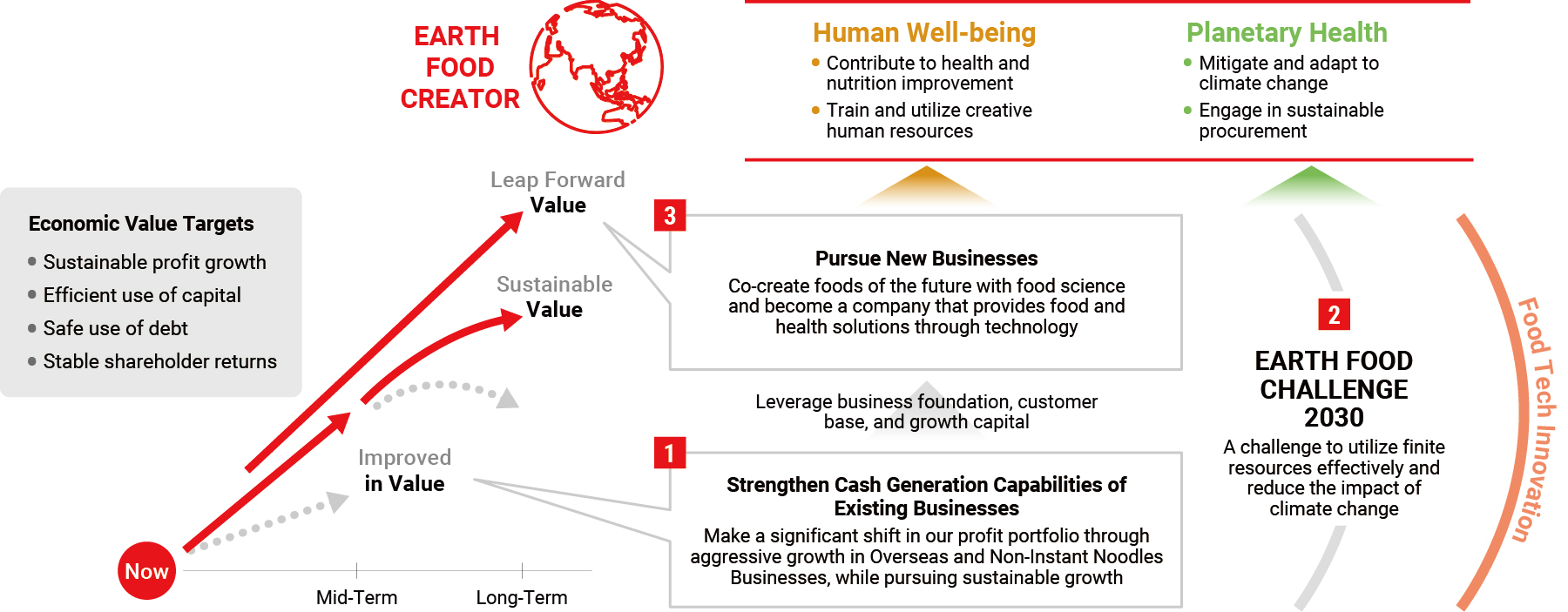
Aiming to Build Top Global Brands
The NISSIN FOODS Group entered a new stage of growth in FY 3/2024. We have already achieved the mid-single-digit % profit growth level projected for the ten years of our mid- to long-term growth scenario beginning in 2021. We are also making progress in the business and organizational structures necessary for becoming a top global company in our field. Given our progress, we updated the KPIs of our Midto Long-Term Growth Strategy. With the rapid growth in core operating profit of existing businesses, our new target is mid-single-digit % growth on an organic basis. We also set a new ROE target of 15% as an indicator of profitability. We also updated the more straightforward goals, calling for revenue of 1 trillion yen, core operating profit of existing businesses of 100 billion yen, and market capitalization of 2 trillion yen, all by FY 3/2031. An ROE of 15% is not a high target exactly, and we understand that we must aim for 20% over the long term.
Our strength lies in a business portfolio that spans all regions of the world. China, which had been a growth driver, continues to face challenges due to the recession. In contrast, growth in the U.S. and Europe has accelerated recently. In the future, our businesses in Asia are expected to be a center of growth. We believe that we will be able to maintain mid-single-digit growth through this type of global portfolio mix, ensuring that there is always an area of the world driving growth.
At the same time, we must improve capital efficiency. We are drawing near to a structure in which the NISSIN FOODS Group increases shareholder returns steadily through investments that ensure growth over the medium to long term, putting the Group on a cycle of rising earnings.
My view of the CSO title is to be a corporate scientific orchestrator, with the most important mission of providing guidance from a big-picture view of our business overall. The NISSIN FOODS Group has created a structure of art and craft. The art is a food culture borne of marketing and innovation through food tech. The craft is borne of accurate, rapid deployment and execution in each operating company and functional business unit. The Group’s corporate division is responsible for the science of analyzing, evaluating, and systematizing these processes and business structures to the greatest possible effect.
Mid- to Long-Term Growth Strategy
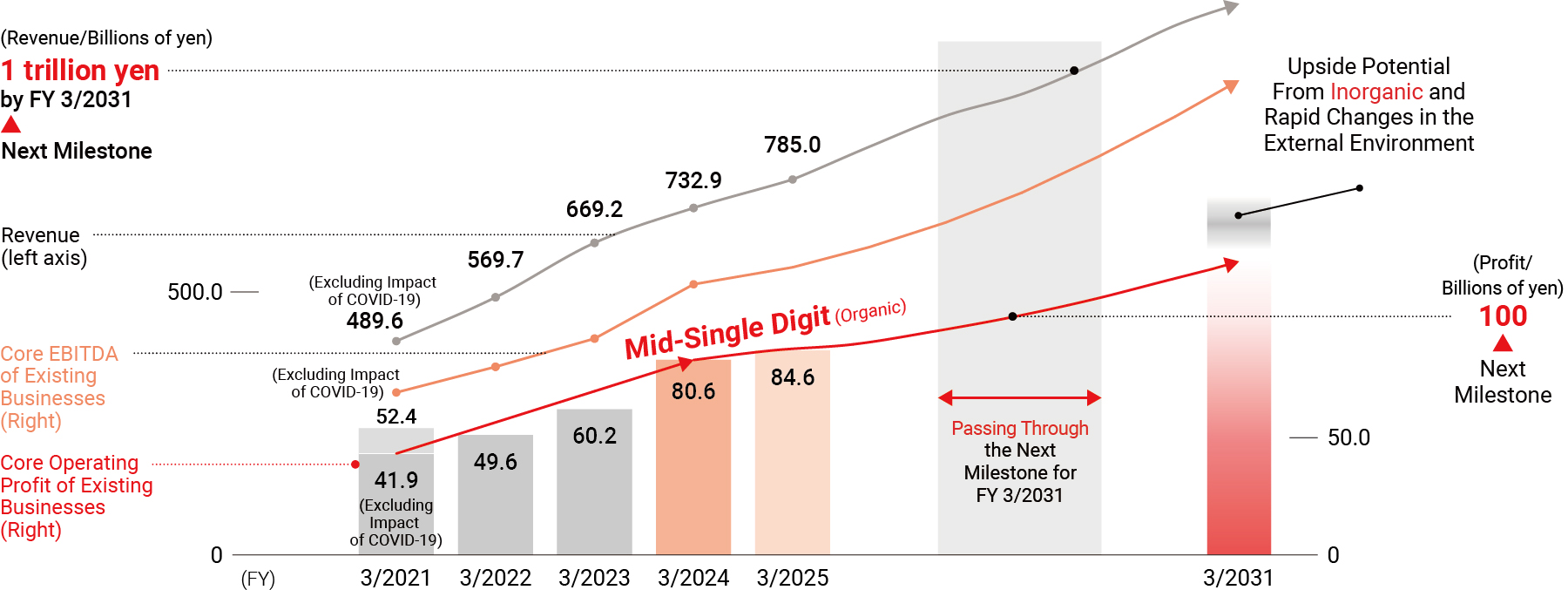
Profit Portfolio by Business
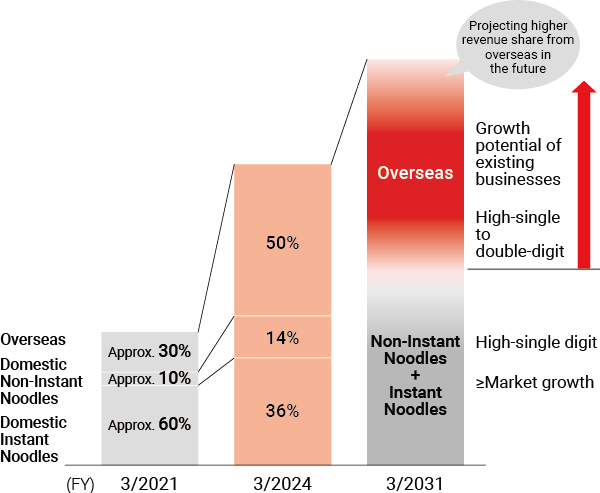
The Next Move for People, Products, and Money Toward Sustained High Growth

As mentioned earlier, we captured growing demand in overseas markets, and we believe there are still latent needs. Therefore, we will continue improving our production systems and other measures. We plan to build new plants, expanding opportunities to offer not only existing products, but also to leverage food tech for new high-value-added products.
By area, we expect Asia and India, in particular, to grow in terms of population and economy. In Europe and the U.S., we see growth not only in America, but also we expect to capture rising demand in Europe and Latin America, including Mexico and Brazil, as well as in Europe. No matter the country, the number of instant noodles servings consumed per person per year—one market indicator we use—is much lower than in Japan; just a few servings per year in some countries. But we know that exposure to instant noodles through our products leads to greater opportunities. We intend to build a solid foothold through brand marketing and products that meet the needs of each region.
How we efficiently allocate and strengthen our people, products, and money will be an important part of accelerating growth. Current business growth has boosted our level of cash flow, or money. At the same time, we are strengthening our products, including expanding manufacturing facilities in the United States and Brazil.
Meanwhile, strengthening our people is an essential element in creating a more flexible and resilient organization. As part of our efforts here, we launched a human resources system in April 2024 that we call the NISSIN-style job-based model. The purpose of the NISSIN-style job-based model is to define job descriptions clearly, recruiting and assigning the right people for the job description and role. We develop specialized personnel within the NISSIN FOODS Group response to global business growth. We also recruit outstanding professionals in various fields from outside the company to step in and play active roles immediately. We are considering expanding the scope of recruiting to include non-management staff and overseas talent, and we are already building a flexible system to recruit people with skills related to the high-demand DX and data-driven fields according to the job description and market value of the candidate.
Quantifying Social Impact Toward Numbers-Based CSV Management
As we expand our business globally and the importance of our brands grows, we must establish systems to understand, evaluate, and maximize the corporate value of the NISSIN FOODS Group. Given our awareness of this issue, we began performing quantitative and qualitative analysis of the relationship between ESG (non-financial value) and corporate value in 2021. We use narrative stories to clarify the relationship between non-financial value and price-to-book ratio (financial value) and ESG actions and corporate value (stock price).
In the area of human capital, we conduct value tree analytics (VTA) analysis, quantifying the effectiveness of measures and verifying that HR initiatives improve employee engagement and lead to enhanced corporate value. In FY 3/2024, which was the third year of this project, we evolved our analyses further and took on the challenge of the impact-weighted accounts framework*1 to quantify the NISSIN FOODS Group impact on society. In the past, we focused on the relationship between non-financial value and financial value, confirming only the areas where our group’s ESG activities had a positive impact financially. Moving forward, we will also focus on the relationship between non-financial value and social value. Here, we intend to visualize the impact of corporate activities on society, including employees, customers, and the environment, in both positive and negative aspects.
For example, employee impact indicates that the social impact of NISSIN FOODS Group employment is comparable to that of companies in the U.S. companies*2 (as calculated by the Harvard Business School). This result is significant, since employee impact serves as the basis for our current human capital initiatives.
Under product impact, we confirmed that RSPO certification*3 in palm oil procurement creates a positive impact on society through reduced CO2 emissions and enforced human rights among producers. We also confirmed that the social impact (in terms of monetary value) of procuring certified products exceeds the added cost. (See p. 44 for details) This quantitative analysis provides a basis for CSV management at the NISSIN FOODS Group and serves as an indicator to raise effectiveness. We will continue to collect more analytical data to improve the accuracy of our analysis and enhance the credibility of our evidence. Eventually, we hope to evolve CSV management as a decision-making tool for prioritizing short-, medium-, and long-term initiatives.
Since assuming the role of CSO, I have been working on organizational development and policies, considering the kind of company we must become to grow steadily in a rapidly changing world. Our activities must be meaningful, not only in terms of financial profit, but meaningful to stakeholders, including humankind and the planet. The NISSIN FOODS Group will remain committed to management firmly oriented toward multi-stakeholders. And we will remain hungry and resilient, knowing No Limit to Growth.
- An accounting method developed under the Impact-Weighted Accounts Framework, established by Harvard Business School professors. The goal is to incorporate social impact into business decisions in addition to traditional financial statements.
- Impact ratio to total wages. Calculates the extent to which total wages are linked to social impact.
- A certification system for the production, processing, and distribution process to encourage companies in the use of sustainable palm oil.
ESG Quantitative Impact Analysis
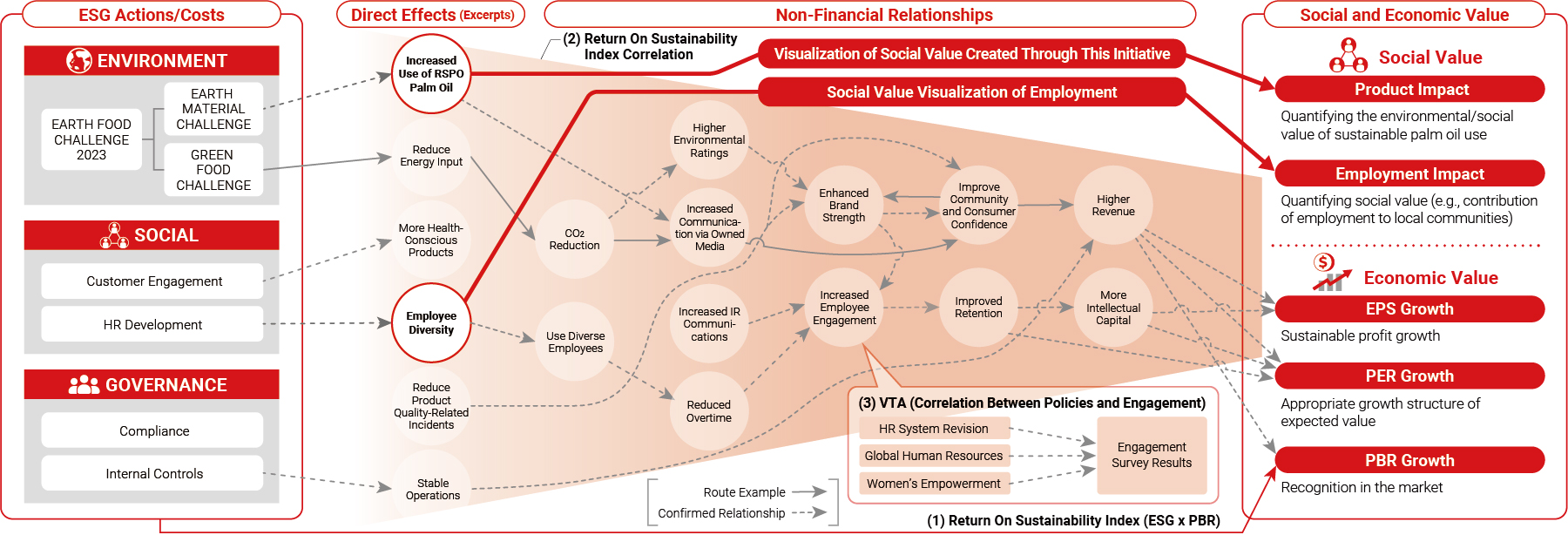
Employee Impact vs Other Companies (Impact as % of Total Salaries Paid)
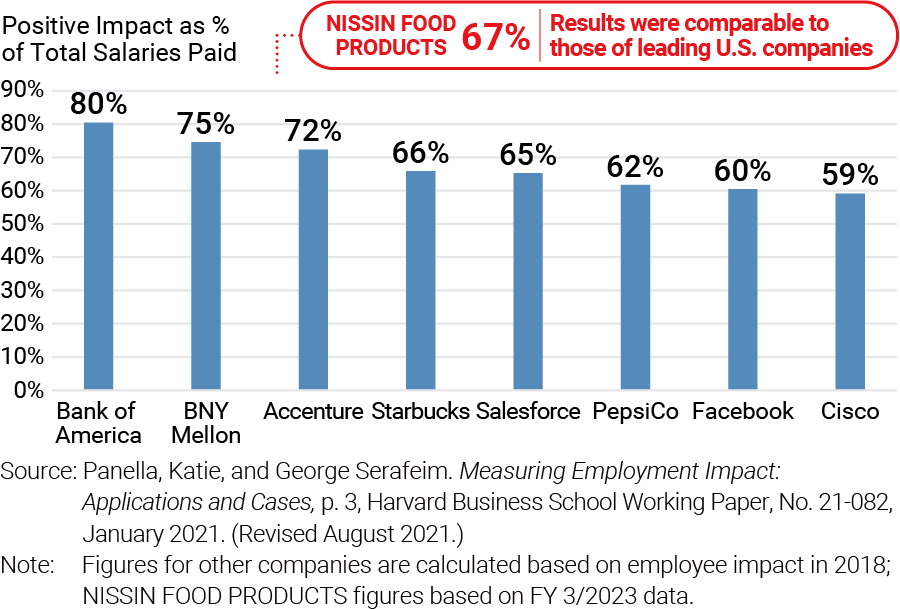
VALUE REPORT
2024
WHO
is the NISSIN FOODS Group? [3.31MB]
- Group Philosophy
- Social Value Creation History
- NISSIN FOODS Group Today
- Six Capitals of the NISSIN FOODS Group
- Core Strengths of the NISSIN FOODS Group
WHAT
are our goals?[3.49MB]
- Our Materiality
- CEO Message
- COO Message
- Outside Director Dialogue
HOW
will we achieve our goals?[8.89MB]
- Value Creation Process
- CSO Message
- CFO Message
-
Growth Strategy 1: Strengthen Cash Generation Capabilities of Existing Businesses
- Domestic Instant Noodles Business
- Domestic Non-Instant Noodles Business
- Overseas Business
-
Growth Strategy 2: EARTH FOOD CHALLENGE 2030
- Challenge to Climate Change
- Challenge to Effectively Use Resources
- Growth Strategy 3: Pursue New Businesses
- Creating and Expanding Touchpoints for Optimized Nutri-Dense Meals
- Creating New Value in Optimized Nutri-Dense Meals
- CHRO Interview
- Strengthening Human Capital
- IR Event Report
- Corporate Governance
- Board of Directors and Audit & Supervisory
Board Members
Data [554KB]
- Financial Summary
- Non-Financial Summary / Major External Evaluations
- Global Instant Noodle Market Data
- Company and Stock Information